Your kitty's recent behavior changes have got you worried, haven't they? The truth is, when a cat is acting strangely it can be due to three major factors: natural life cycle changes, stress, or an indication of an injury or disease onset. In this article, we will examine these typical changes in cat behavior and interpret what they could mean.
It's true, both gradual and sudden alterations in your cat's demeanor deserve your attention. As loving cat owners, our role is to monitor these changes and act when needed. But what actions are appropriate?
We'll explain what you should do if your cat starts to behave unusually. We will also explore normal behavioral adjustments in cats as they mature, and point out certain changes that are not a normal part of a cat's life and could signal a health or behavior problem.
This guide will provide insights into expected behavioral changes that occur throughout your cat's life cycle, such as maturing from a kitten into an adult cat or growing old. We will also highlight unexpected behavioral changes that might hint at a problem, such as increased aggression, changes in eating or drinking habits, or unusual fear and hiding behavior.
Lastly, we will tackle sudden, out-of-the-blue behavioral shifts that may not be related to the cat's life cycle at all, such as "My cat suddenly stopped eating" or "Why is my cat suddenly so affectionate?"
Stay with us as we help you understand your cat better and ensure its well-being.
Understanding Kitty's Unusual Actions: A Brief Overview
Understanding your pet's behavior changes is critical and it usually boils down to three primary factors:
- A natural change in the life cycle (growing old, going into heat, etc.)
- The result of an injury or the onset of disease.
- A symptom of stress—sudden or prolonged.
Whether gradual or sudden, a change in your cat's behavior should indeed be a cause for concern. Changes in feline behavior can mean many things. As owners, we have to watch out for such changes and take action when necessary.
What to do if your cat is behaving strangely
The answer depends on the type of change. Keep reading to find out the change your cat is going through—and what to do about it.
Some changes in behavior are normal.
Cats adjust their behavior as they grow up. Kittens act differently from adults, and senior cats often display a different temperament than that of younger cats.
Then again, some changes in behavior are not a normal part of a cat's life. These can indicate the onset of an actual health or behavior problem.
Let's go over the normal - and the not-so-normal - changes in feline behavior and see where your cat fits in and what you need to do.
Expected behavioral changes relating to the cat's life cycle
In a nutshell, these are the changes a cat experiences during the feline life cycle:
- Maturing from a kitten into an adult cat
- Going into heat (for non-spayed females)
- Sexual maturity (for non-neutered males)
- Growing old
Unexpected behavioral changes
These changes are often more sudden and are likely to be a sign that the cat has a problem. They include situations where your cat begins to -
- Display needy behavior
- Avoid eating or drinking
- Seem scared and hide
- Bite and generally show signs of aggression
- Avoid the litter box
- Act strangely after being outside
We'll cover these and more in this guide, starting with normal behavior changes during the lifetime of a well-adjusted and generally healthy cat and moving on to the more mysterious sudden, and unexpected changes in behavior.
What are Normal Behavior Changes in Kittens?
Generally speaking, kittens are more energetic than adult cats. They tend to be more curious, explore their surroundings, and play with their siblings or other pets in the household. This is how kittens learn about the world and what being a feline is all about.
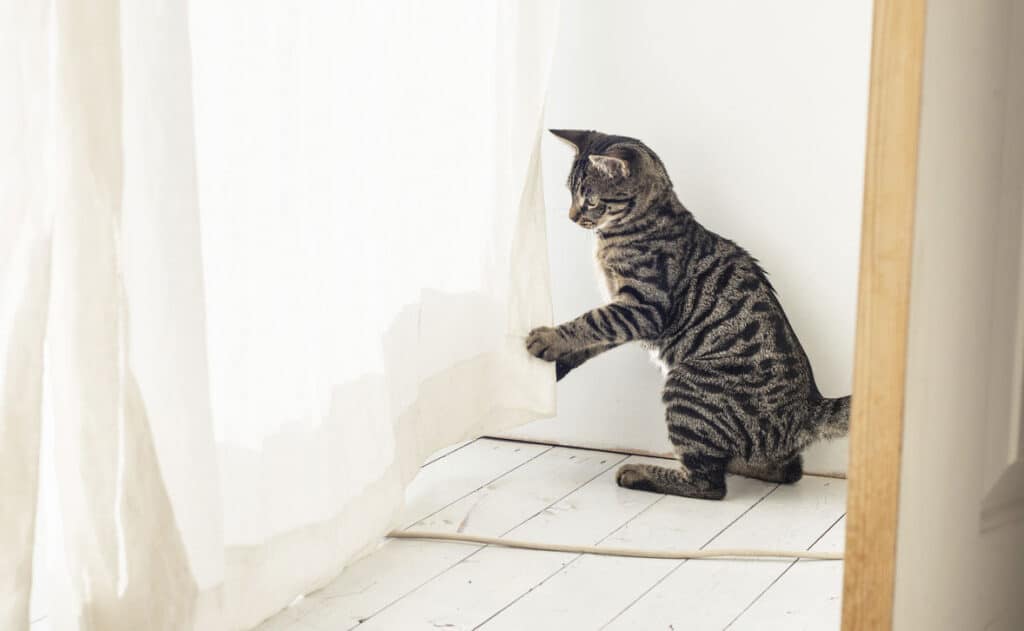
That's why kittens need close supervision to make sure they stay out of trouble. They can also be quite tiring, as they seem to relentlessly jump, bite, chew on things, climb, and generally interact with everything and everyone between long sessions of deep sleep.
This eventually changes.
As they grow older and mature, kittens calm down and lose the hyperactive streak. This is a gradual process that usually begins when the kitten is 4-6 months old and with some cats can take up to 2-3 years.
Behavioral changes in non-neutered male kittens as they mature
Male kittens usually reach sexual maturity between 5 to 8 months of age. When those male hormones kick in, the kitten's behavior is likely to change.
The kitten will generally become more territorial and may display the following:
- Increased aggression levels toward other cats and people
- A tendency to roam (indoor-only intact males may try to get out)
- Urine spraying around the home
Not all males become aggressive or spray urine, but most do. The only way to stop these unwanted behaviors is by neutering the male to lower the levels of testosterone. Once these behaviors turn into habits, even neutering doesn't always help.
The solution?
An ounce of prevention is definitely a pound of cure in this case. Has your male kitten been neutered before the age of five months to make sure he doesn't develop these behavior problems?
Behavioral Changes in Female Kittens as They Mature
Female cats usually reach sexual maturity between the ages of five and seven months. Once that happens, the female will routinely go through heat cycles during most of the year (with the possible exception of winter months).
During the heat cycle, the female will display significant behavioral changes—all of them due to the fluctuating hormones in her blood. The heat cycle will last 1-2 weeks, during which the female may display the following behaviors:
- Excessive affection
- Head rubbing against objects and people
- Loud meowing
- Crouching on the ground and extending the neck upwards
- Possible urine marking or just urinating outside the litter box
The solution?
Responsible cat owners spay and neuter their pet cats before they are five months old. This is usually enough to prevent female kittens from going into heat.
Please save your cat from the stress of the heat cycle and prevent unwanted pregnancies by spaying Kitty in time.
How Does a Cat's Behavior Change After Spaying or Neutering?
Generally, cats become less aggressive, more playful, and inclined to seek an owner's attention following a spaying or neutering procedure.
If the cat had already reached sexual maturity then neutering/spaying will stop the unwanted behaviors associated with that. Roaming, fighting with other cats and spraying will decrease significantly in neutered male cats. Female cats will stop going into heat.
What are Normal Behavior Changes in Aging Cats?
Just like humans, cats slow down with age. Many will experience some decrease in sensory abilities. They don't hear and see like they used to and might display their version of "senior moments".
Fortunately, most cats do not become senile and can enjoy their golden years. In terms of behavior, they may "slow down" a little but should remain active and in good health.
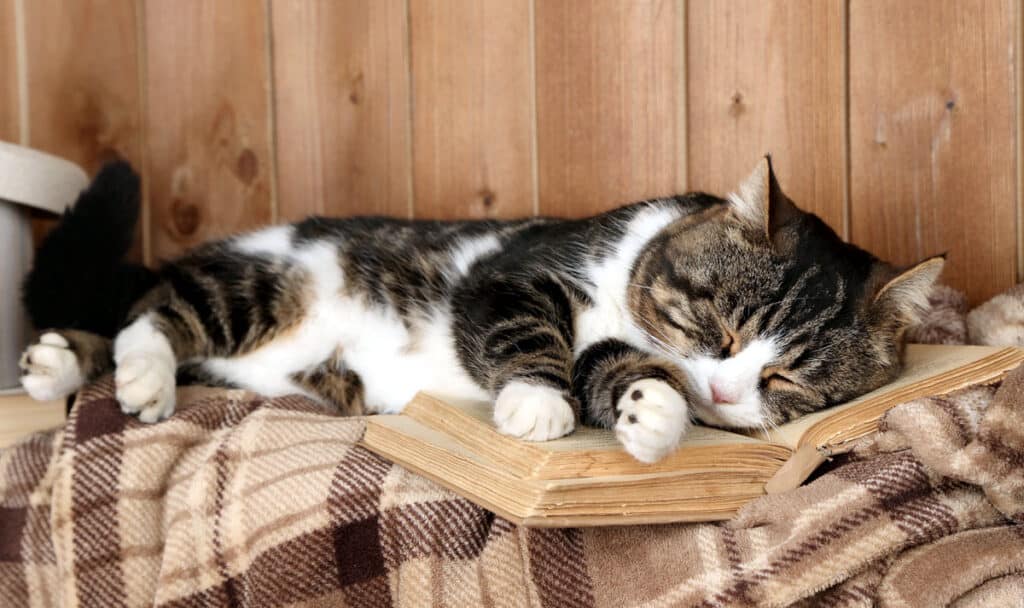
And then there are those who have a more difficult time coping with old age.
Some aging cats may experience a decline in mental functioning known as FCD or Feline Cognitive Dysfunction.
Cats suffering from FCD present deficiencies in hearing, vision, general awareness of their environment, memory, and ability to learn. FCD can disturb normal sleeping patterns, reduce activity, and disorient cats at times. In some cases, older cats with FCD forget where their litter box is located and urinate or defecate outside the litter box. Unusual aggressive behavior can also emerge in typically mellow cats as their confusion and memory loss increase.
Signs a cat is having episodes of disorientation include:
- Getting lost in a familiar environment
- Fixating/staring at an object
- Staring into space for extended periods
- Wandering aimlessly in their home
- Excessive vocalization, especially at night
Cats with feline cognitive dysfunction may also appear less interested in interacting with owners, greeting people they know, or socializing with other pets. Alternatively, some cats become clingy and over-dependent, desiring more contact with owners. Additionally, they may eat less, groom themselves less frequently and vocalize loudly for no apparent reason.
When should you talk to your vet?
Any abnormal behavior in an aging cat should be evaluated by a veterinarian to determine if the cause is FCD or illness. Degenerative and/or painful disorders such as arthritis, urinary tract disease, thyroid dysfunction, or diabetes can increase irritability, sensitivity to being touched, and instinctual aggression in cats regardless of their age.
Don't forget to talk to your vet about routine checkups. Their frequency should increase with age. Just how often would depend on the cat's age, overall condition, and the amount of stress he or she experiences by going to the vet.
Behavioral changes in cats that are not related to life stages
And now it's time to address the other kind of behavioral changes in cats. The kind that isn't related to the cat's "normal" life cycle.
We like to call it: "My cat suddenly..."
These could be changes with very sudden onset indeed:
"My sweet-natured Fluffy suddenly attacked me!"
Or the onset could be a tad more gradual, taking hours, days, or even weeks:
"Over the past week, I've noticed my cat has become more clingy than before."
So, what's going on?
Let's explore various scenarios to learn more.
"Why is my cat suddenly so affectionate?"
If your cat hasn't been spayed yet then chances are she's going into heat. In many females, excessive affection is often the first sign. Now would be a good time to call your vet and set up a date to get her spayed as soon as possible.
If Kitty is already spayed—or is a male—you need to look for other causes.
If by affectionate, you're referring to purring more than usual, this could actually indicate pain. See our article about signs of pain in cats to check if other signs are present and talk to your vet.
Just to clarify—it's perfectly natural for a cat to be affectionate. It's when an adult cat suddenly becomes significantly more affectionate and even clingy that you need to figure out what's going on.
Many cats become clingy when their owner returns after being away from home for a long while. A list of potential stressors in cats and ideas on how to help alleviate that stress.
SIGN UP FOR THECATSITE'S EMAIL UPDATES >
"Why has my cat stopped eating or drinking?"
The top reason cats refuse to eat or drink is that they're not feeling too well.
This could be something minor that soon goes away by itself. For example, a lack of appetite can follow a minor viral infection, any sedation or anesthesia procedure, or sometimes even vaccinations.
Or it could be something more substantial.
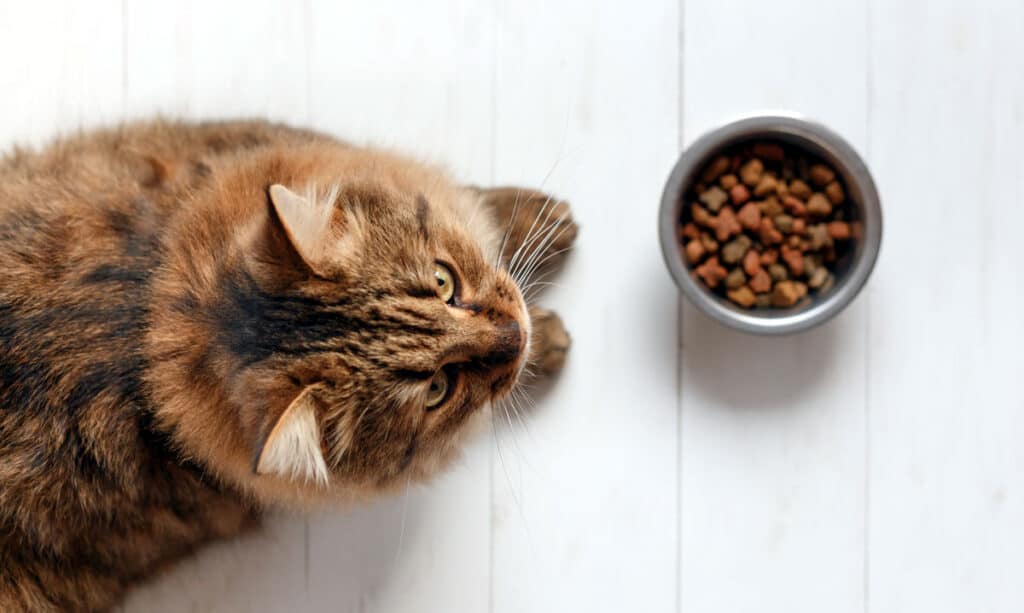
Teeth and/or gum infections often make it too painful for a cat to eat or even drink water. So would anything that becomes lodged anywhere in the cat's mouth or nose. Of course, infections and other diseases can also cause a lack of appetite.
Stress caused by environmental and household changes may also interfere with a cat's appetite. If you bring home a shy cat, he or she may refuse to leave the security of that dark place behind the couch, even to drink or eat. That's why you should always introduce a cat to a new environment gradually, creating a safe room where the cat will have undisturbed access to food, water, and the litterbox.
Here's the thing:
While it's not unusual for a cat to refuse to eat or drink for a day, cats that haven't eaten for 24 hours or longer should be seen by a veterinarian. Rapid weight loss can cause a serious disease called hepatic lipidosis, to the point of liver failure.
So, what can you do about it?
If your cat has stopped eating and hasn't had any food in 24 hours, call your veterinarian. Kitty will need to be assessed and treated as soon as possible.
Read more about our guide about how to get a cat to eat again, filled with advice given by experienced cat owners.
"Why Does My Cat Suddenly Act Frightened and Hide?"
Well, your cat is probably afraid. The question is—of what?
First, let's talk about medical issues.
A cat may actually try to hide away from pain. In fact, many owners of outdoor cats have noticed how their cats wander off and hide under a bush when the time comes for them to die. Watch for other signs that your cat may be in pain and talk to your veterinarian if you suspect Kitty may be ill.
Once you rule out health issues, it's time to look for whatever it was that scared your cat. Sometimes the answer is easy. A new pet, a visitor, fireworks outside, or even seeing a strange feral cat through the window can send a timid cat into hiding.
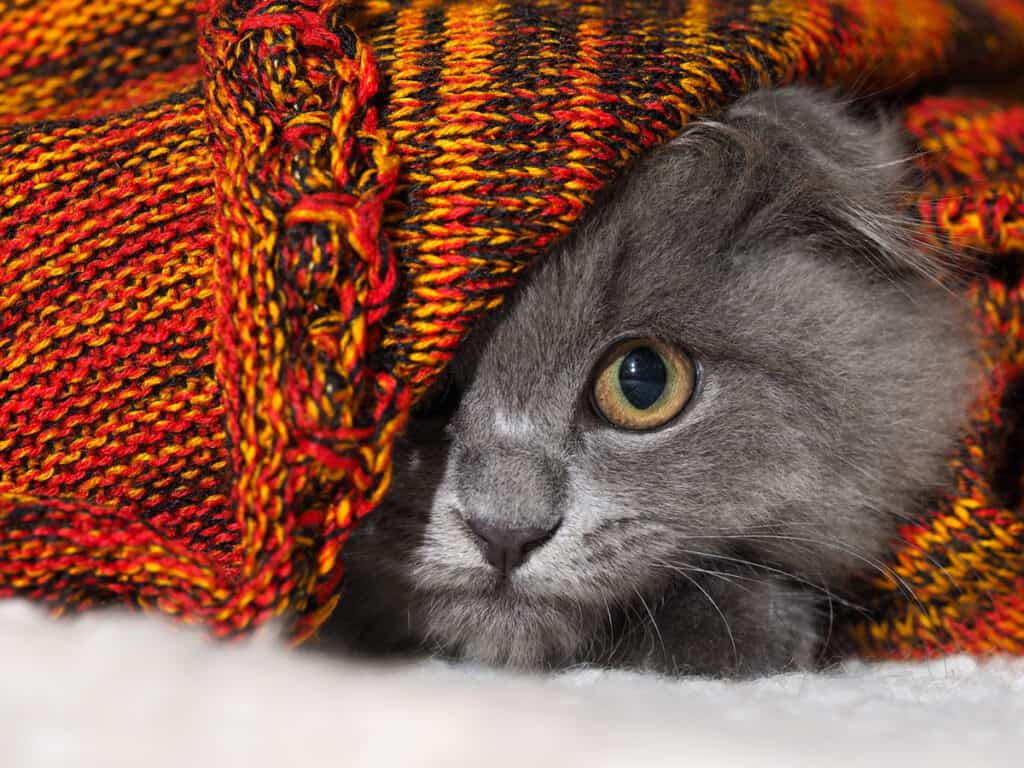
For some cats, going to the vet is a nerve-wracking experience and requires a period of time to de-stress once they get home. Hiding may be a cat's way of calming themselves down before returning to normal behavior.
What to do if your cat is suddenly hiding?
The key here is to figure out what's bothering your cat and address the cause of the fear. Never force a cat out of his or her hiding place. Find out what's bothering her and fix the issue. Follow the steps in this guide:
How To Get A Cat To Come Out Of Hiding?
"Why has my cat suddenly started biting?"
Cats bite or nip owners for a variety of reasons. Some cats are more aggressive than others, or they may be too sensitive to petting. Owners usually learn to recognize their cat's patterns and find solutions to aggression issues. If you've been dealing with an aggression problem for a long time, here are a few guides that may help you identify the cause of the aggressive behavior and find solutions:
But what about a sudden onset of aggression?
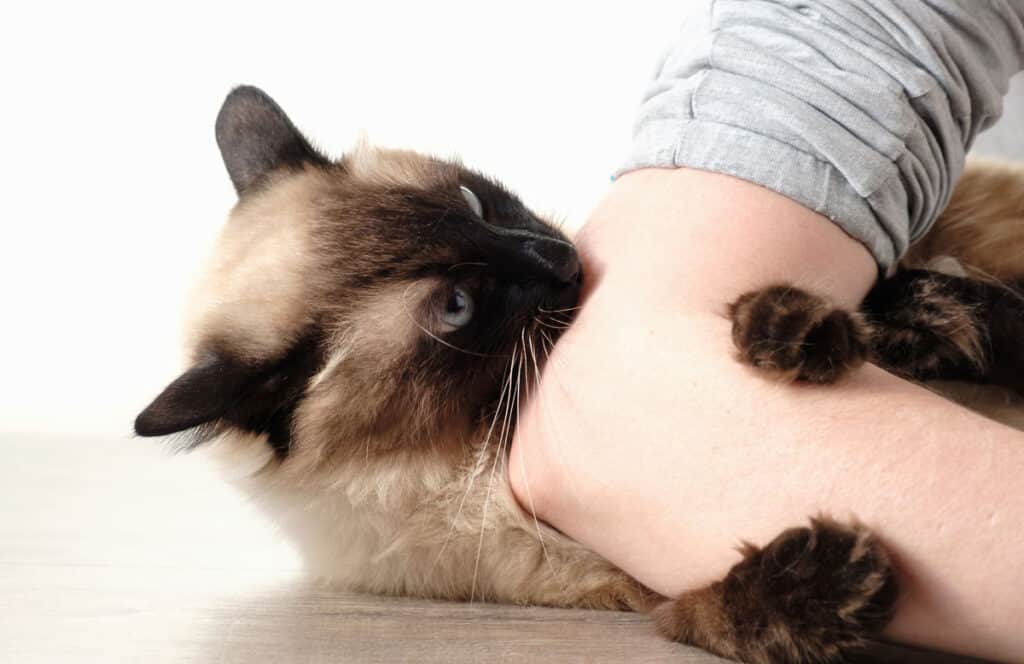
What to do when an otherwise loving non-aggressive cat suddenly turns on you, hissing and possibly even biting and scratching?
The first thing you need to check is... you guessed it, your cat's medical condition.
When in pain, even the friendliest cat may try to attack people around him. Just ask any veterinarian.
Sometimes the cat may be generally fine but react violently if you touch a painful spot. This doesn't even have to be a major medical issue - matted fur pulling on delicate feline skin can be enough to trigger a bite. Or it could be something more serious.
Other times, you may be dealing with re-directed aggression. Kitty may have been upset by something else inside your home - or out of it. Fear triggers aggressive behavior in some cats, and they sometimes get redirected to the nearest target around them.
If you suspect you may be dealing with re-directed aggression, read this guide:
Re-directed Aggression In Cats
"Why has my cat stopped using the litter box?"
There are many possible reasons for a cat to stop using the litter box. Generally speaking, they belong to one of three groups -
- Medical issues
- Problems with the litter box
- Stress
And yes, it can be a combination of reasons.
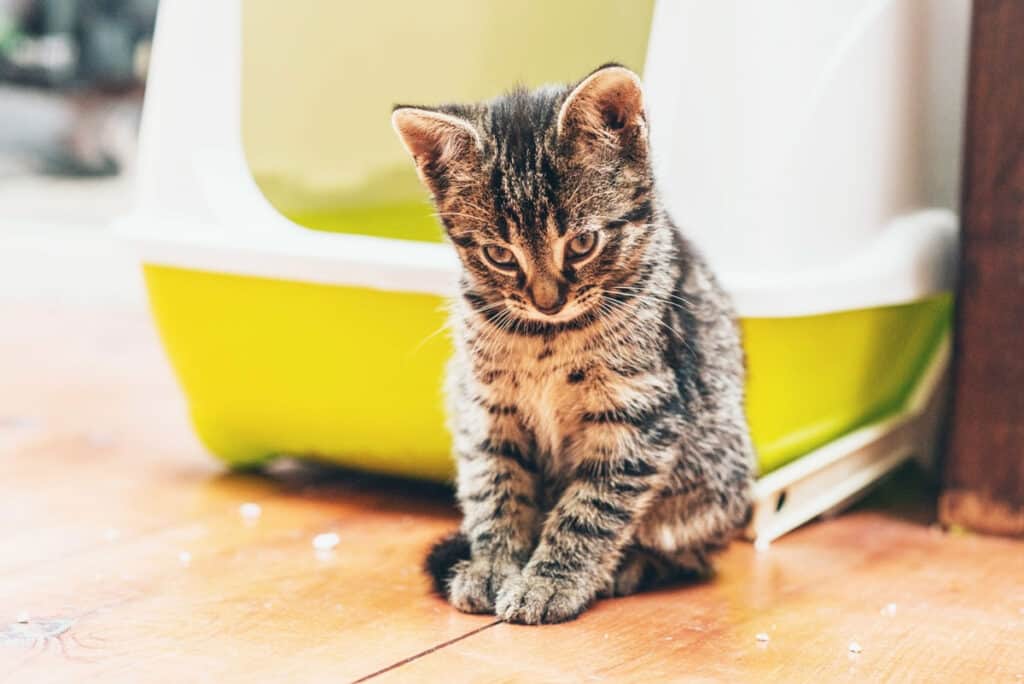
If your cat has stopped using the litter box, the first thing you need to do is schedule an appointment with the vet.
More often than not, there is a medical problem that's keeping the cat away from the box. Without solving that issue, you won't be able to re-train Kitty to use the box again.
Read more on how to figure out what's keeping your cat away from the litter box and how to solve the problem:
How To Solve Litterbox Problems In Cats: The Ultimate Guide
"Why is my cat acting strange after being outside?"
Injuries, disease, and parasites can all make your cat ill following a visit to the great outdoors. Cats that go outside can get into all sorts of trouble as follows:
- Abscesses caused by catfights
- Disease contracted from other cats
- Fleas
- Worms and other parasites
- Fractures and other injuries
- Stings and bites from small critters
- Poisoning
- Foreign objects lodged in various body cavities
If Kitty seems more distant or quiet after being outside, he or she may not be feeling well. Whether or not this was a regular outing, call your vet and get your cat checked out.
Final Words
As you may have noticed, almost any behavioral change could indicate a health problem. When a cat is sick, he or she cannot tell you as much. At least not in words. A sudden behavior change may be the only sign that the cat isn't well.
Talk to your veterinarian if you suspect a problem. Rule out medical causes and then explore behavioral options. And if you're not sure why your cat's behavior has changed all of a sudden, post your question in the cat behavior forum. That's where our members can try and help out.
If you can share a story about a sudden behavior change in your cat and how you solved the problem, please leave it as a comment below. Just remember—don't leave questions in the comment form. It may take too long for someone to see them here. Instead, post your questions in the cat behavior forum where others can see them and reply.
SIGN UP FOR THECATSITE'S EMAIL UPDATES >
Note: We may get commissions for purchases made through links on this page.


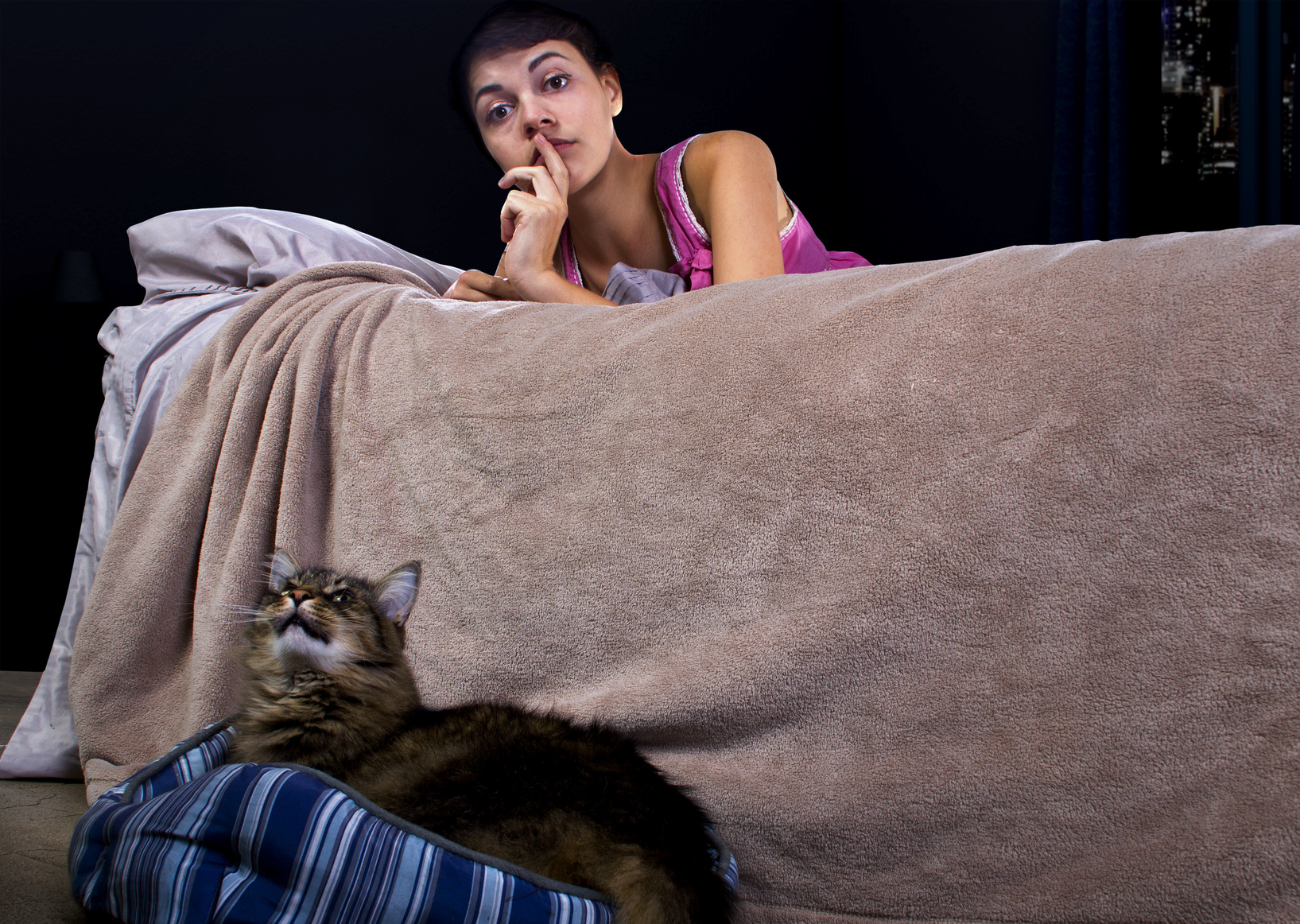

17 comments on “Cat Acting Strangely? Here’s What It Could Mean”